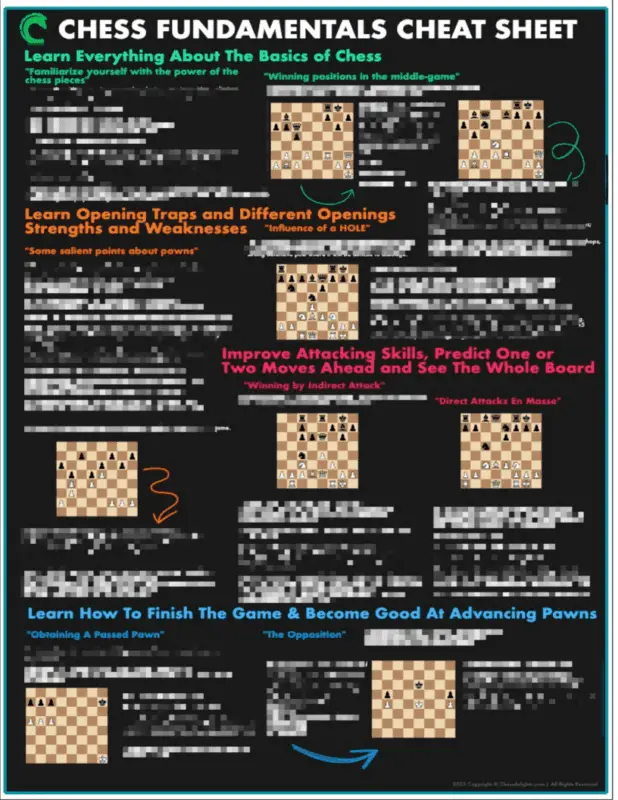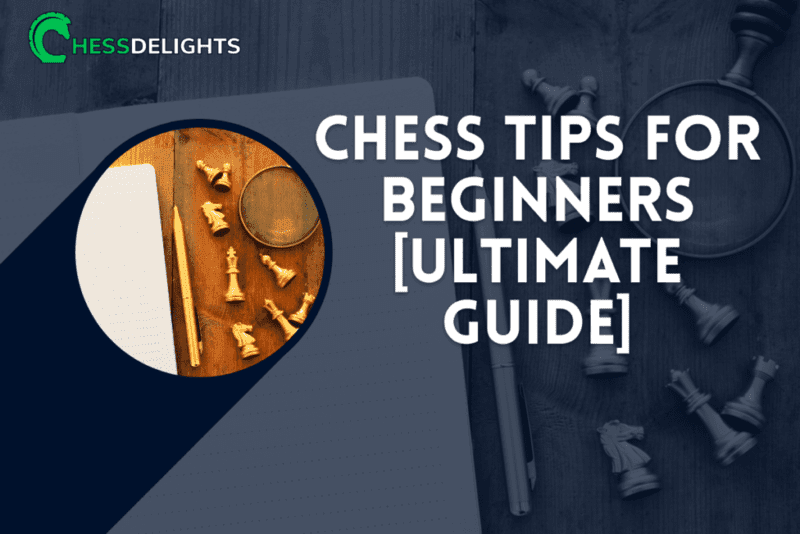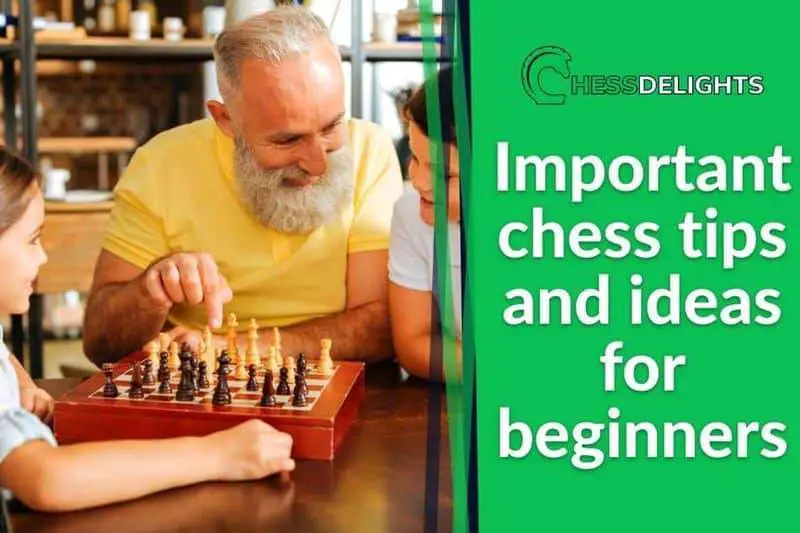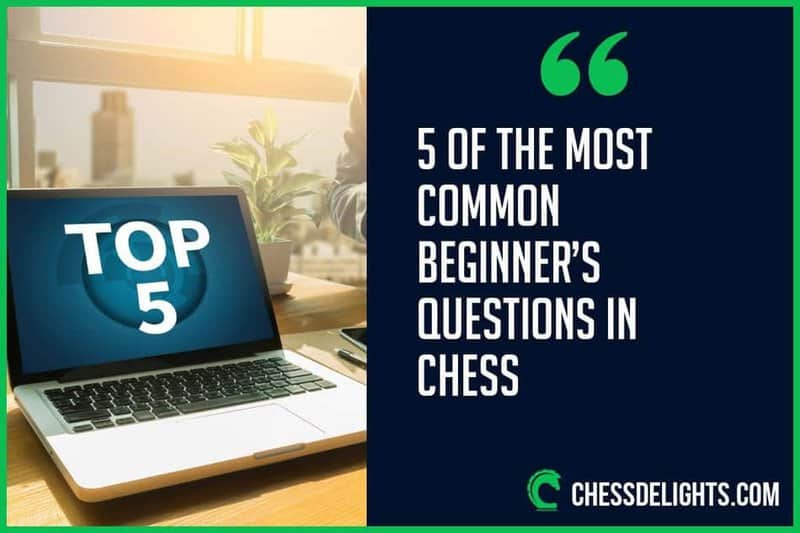How do you get better at chess? The most common answer is you should practice and play every day to become good at chess.
I would say that is true, but the real question to ask is, did you get better at chess? If you feel that getting better means learning a chess trap or an unstoppable chess tactic, you can say that you became better at chess.
If you want to measure your success in learning chess, you should first know what you are trying to achieve. Once you have completed it, move on to the next until you reach your highest chess goal.
This advice is for beginners or chess enthusiasts like me – I also wrote some useful tips in this article!
Here are the 10 tips on how to get better at chess for beginners!
1. You need to question every move you make!
When you are learning how to get better at chess, you need to question every move you make
Here are some questions that you can use and practice when playing chess:
- Is the square I'm moving this piece to better than the one it is on?
- Will moving a different piece be more effective in improving my strategic position?
- How does this move help protect me from the threat posed by my opponent?
- Is this piece safe on this square?
- Can I keep this piece safe from attack?
- Can my move quickly force me into retreat, thus wasting a move?
- Is this the best move I can make right now?
One of the world's best chess grandmasters once said: whenever you see what you consider an excellent strategic move, always stop and look for better ones. Following this simple rule will improve your chess game.
2. Study every move your opponent makes
I often neglect to study my opponent’s every move most of the time, and I will keep on missing opportunities!
After every move, your opponent makes, stop, and think.
Again you can ask yourself questions like
- Why did they do that?
- What are they trying to achieve?
- What piece are they trying to take?
- What are they planning?
Always remain alert for strategies that your opponents are using. This will allow you to defend against the threats posed by your opponent successfully. Unless you learn to defend, you can never carry out your attacking strategies. Figuring out what your opponent is trying to do will makes ruining their plans easier.
3. Always have a plan no matter what
I don’t play a move without a plan, but sometimes I try to distract my opponent by moving a pawn even if I don’t have a plan…lol! It works sometimes, but most of the time, it doesn’t work!
Without an obvious strategy or plan, your opponent will not have a difficult time defending. If you haphazardly threaten one piece from one side of the board and another on the other side of the board in alternative moves, it's easy to defend against. Chess pieces in a coordinating strategy to attack help them work together, and it’s far more effective.
Getting pieces to work in harmony with each other is the most effective method to win in chess. For example, when you're trying to checkmate an opponent, using less piece can be successful, but your strategy will be far more effective when you combine two or three pieces.
4. Understand the value of each chess piece
Before you consider sacrificing one of your pieces to be one of your opponents, you need to fully understand the value of each piece, not just how many your opponent has. The general rule is that the player with the higher value pieces usually wins the game. The more material you can collect (high-value pieces belonging to your opponent), the greater chance you have of winning.
If you want to know each piece's number of values, I have written an article about that here!
5. Look to develop your pieces on the board quickly
Most beginners spend far too much time moving pieces such as pawns around the board at the beginning of their game and less time trying to take control.
It's nearly impossible to win a game of chess using pawns alone, so getting your Queen, Rooks, Bishops, and Knights into play quickly will have a far more effective strategy. The sooner you bring them out, the sooner you can gain control of the board.
Initially, you would have to move something else to guarantee your stronger pieces can safely move on the board; once these pieces have been developed, you should only be moving a piece to fit your plan.
Try to determine the best position to put each of your pieces and get it there in as few moves as possible.
6. Gain control of the center square
Well, another one of the most common pieces of advice in getting better at chess, controlling the center square is one of the most important aspects of chess strategy.
While not guaranteed as a winning strategy, if you gain control of the four squares in the board's center, your chances of winning are much higher. It's good to learn and watch some games where the chess players are desperately trying to take advantage of the center – and the one who gains control of it usually has the advantage throughout the game.
Any piece in the center of the board controls more of the board. For example, if you put one of your Knights in a center Square and one in the board's corner, the Knight in the center can move to eight different squares where the one in the corner can only move to two.
7. Do not forget to protect your King
This one may seem obvious as the game's objective is to put your opponent's King in checkmate. What I mean by this is that people sometimes lose focus on their defense while they're hunting their opponent's King.
I experienced this while playing what I thought was a winning situation for me, but I forget to protect my King at the last moment, and I got checkmated by what you call as a back rank checkmate.
You need to make sure that your King is protected at all times! Learn from my experience! 🙂
8. Exchange your weak pieces to your opponent’s active pieces
An effective strategy to implement is trading pieces, especially if you can capture a piece worth more than the one you're sacrificing. This is described as winning material, but this strategy only usually works against more reckless opponents… lol!
Usually, if you have gained initiative and control of the board, try not to exchange pieces unless it's part of your strategy, and it increases your advantage. The more pieces you have, the weaker the attacking threats of your opponent will be.
I remember watching a grandmaster’s game, and he methodically exchanged his pieces to his opponents more active pieces, and he eventually won the game easily. It's an excellent strategy to look at your opponent’s most active pieces and exchange it with your weak pieces.
9. Learn to use your Knights and Bishops effectively
It's important not to waste moves at the beginning of any game. Your focus should be on making moves that affect your ability to win. For example, Knights and Bishops are of equal power at the early stages of a game because of their starting positions.
However, once the board opens up, Bishops are far more effective pieces as they can influence way more of the board at once. In comparison, Knights take too much time to get anywhere.
10. Learn no to quit the game even if it looks like you are losing
I see so many players lose games from winning positions because they relax when they have reached a specific point, they think the game is over. Assuming you have a game won is a perfectly natural attitude, but they will lead to negative results more often than not. Even the best players in the world have snatched defeat for the jaws of victory.
Remember that even the most advantageous position on the board cannot win by itself; you need to take advantage of this position. Even losing players can pose many threats if you don't remain alert. Remaining focused from beginning to end is the most important tip anyone can give you to succeed in chess. Conversely, never quit a game unless your position is lost.
Like what I said at the beginning of this article, pretty much everything else you will need to know about how to get better at chess comes from practice, experience, and studying the game.
Wrapping Up
There are many more tips that you can search online about how to get better at chess, but most likely, you need to follow some of the information in this article, and you can gain more than looking at all other tips online!
Like I said in my introduction you need to have a way to measure if you are achieving your goal of getting better at chess!
To help you remember all of these tips, I’m going to write them below:
1. You need to question every move you make!
2. Study every move your opponent makes
3. Always have a plan no matter what
4. Understand the value of each chess piece
5. Look to develop your pieces on the board quickly
6. Gain control of the center square
7. Do not forget to protect your King
8. Exchange your weak pieces to your opponent’s active pieces
9. Learn to use your Knights and Bishops effectively
10. Learn no to quit the game even if it looks like you are losing
If you want to read more related articles, in getting better at chess end game go here and if you want to learn other ways go here! Enjoy learning chess! 🙂





